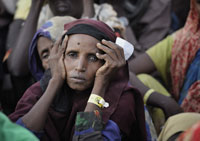|
|
| Photo by Paul Jeffrey, ACT Alliance |
| A newly arrived Somali woman waits in line for food to be distributed at the reception center of the Dagahaley refugee camp, part of the Dadaab refugee complex in northeastern Kenya. |
Thousands of Somalis are feared dead as famine grips the eastern Horn of Africa in the worst drought since 1950. A poor rainy season again this year means that the October harvest will not yield enough food. Crop failures will put 11 million people, mostly in Somalia, Ethiopia and Kenya, at risk of malnutrition.
“This is an unprecedented humanitarian crisis that deserves the attention and support of the world,” said Zach Wolgemuth, associate director for Brethren Disaster Ministries.
Early last week, the UN officially declared a famine in parts of southern Somalia for the first time in nearly twenty years. A food crisis becomes a famine only when certain conditions are met – at least 20 percent of households face extreme food shortages with a limited ability to cope; acute malnutrition rates exceed 30 percent; and the death rate exceeds two persons per day per 10,000 persons.
Other factors compounding the food insecurity in Somalia include the country’s anarchic government, persistent fighting, large-scale displacement, widespread poverty, and disease. Trekking on foot for weeks or months to escape the drought, thousands of displaced Somalis are pouring across the border into neighboring Kenya carrying small children and whatever possessions they can manage. Some of the mothers arrive with dead infants in their arms.
The Church of the Brethren has released $40,000 from the Emergency Disaster Fund to support the relief efforts of international partner Church World Service (CWS). According to an appeal released by CWS on July 21, 2011, the agency is focusing work on both immediate relief and longer-term food security and water initiatives. Work is focused in Kenya, Somalia and Ethiopia.
The CWS appeal states that the immediate work in Kenya, in cooperation with the ACT Alliance (Action by Churches Together), will involve provision of family food packages, Unimix nutritional supplement for children under the age of five, and water tinkering. The program will target over 97,500 families. Longer-term, CWS will bolster existing disaster risk reduction initiatives with food security, nutrition, and livelihood efforts, and construction of permanent water systems.
The CWS-supported efforts in Somalia are focused on contributing to the work by fellow members of ACT Alliance: Lutheran World Federation and Norwegian Church Aid. This includes emergency food, non-food items (shelter, clothing, hygiene materials), water and sanitation in the crisis phase at three of the border camps which currently house some 358,000 refugees.
In Ethiopia, CWS is supporting the response efforts by the Ethiopian Evangelical Church Mekane Yesus Development and Social Services Commission, who is providing food aid to 68,812 persons. The monthly rations consist of wheat, beans and cooking oil. Children under five, and pregnant or lactating women are receiving supplementary food, known as Famix, as well.
Contributions to support the East Africa drought and famine response may be sent to: Emergency Disaster Fund, Church of the Brethren, 1451 Dundee Avenue, Elgin, IL 60120 or made online at www.brethren.org/africafamine.
Jane Yount, Coordinator for Brethren Disaster Ministries, in New Windsor, Maryland.
